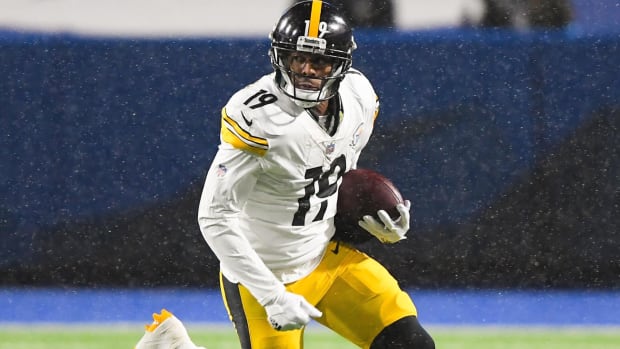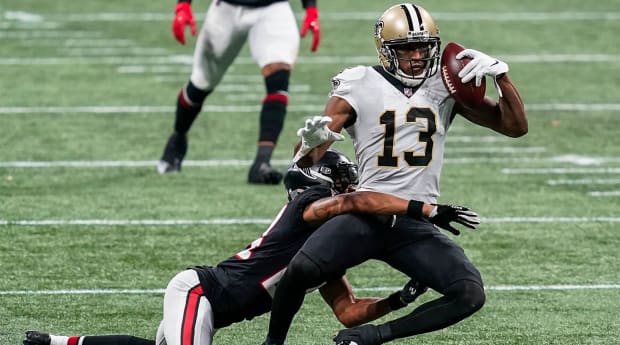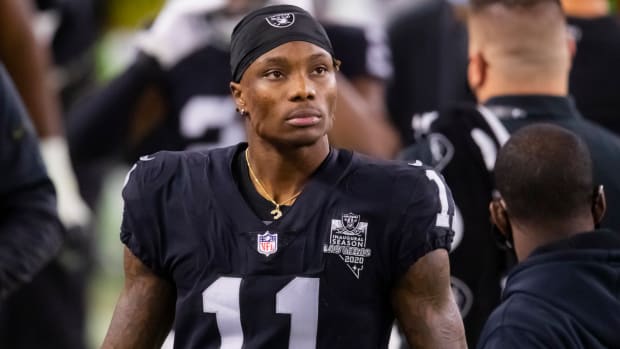A closer look at fantasy football's backup wide receivers draft value, potential, average draft position and outlook for the 2021 NFL season
In the high-stakes market, the top fantasy owners would like to have depth at wide receiver to help cover bye weeks and injuries. They would also like to start a wideout at the flex position in as many weeks as possible. In most fantasy formats, a starting roster consists of three wide receivers and one flex option (RB, WR, TE).
The best lineup structure is with leagues that use two flex positions, two running backs, and two wide receivers. It gives fantasy owners the ability to take full advantage of their roster by not being penalized by having one extra good player on their bench.
ADP Breakdowns
QB1 | QB2 | RB1 & RB2 | RB3 & RB4 | WR1 & WR2 | WR3/WR4/WR5 | TE
If you drafted a team with four good running backs and four possible starting wideouts, there would be lineup decisions each week. After a couple of injuries at wide receivers, this roster structure (two RBs, three WRs, and one flex) forces fantasy owners to start a weaker WR3 while a possible viable top 24 running back sits on your bench. At the same time, it allows fantasy owners to develop their rosters in different ways on draft days.
One high-stakes league uses two running backs, three wide receivers, and two flex. This structure puts a premium on drafting wide receiver depth at the expense of quarterbacks, RB2s, and tight ends.
WR3 (Ranked 25th to 36th)

From the fifth round through the eighth round of many drafts this year, there will be a wide range of opinions of each wide receiver in this grouping. Each fantasy site will have different ADPs, creating some values as well as pitfalls.
Injury News Players
Odell Beckham, Cleveland Browns
Beckham tore his ACL in his left knee in Week 7 in 2020. He remains on the injury report for the Browns despite avoiding the PUP list at the beginning of training camp. All reports remain positive on his recovery, and Cleveland expects him to be in the starting lineup Week 1. He won’t play in the preseason.
I’m never a fan of players coming off significant injuries. Beckham offered electric upside over his first three seasons with the Giants (91/1,305/12, 96/1,450/13, and 101/1,367/10), giving lockdown WR1 status. In 2018 and 2019, he finished 15th and 25th in wide receiver scoring in PPR leagues. Beckham looks fairly priced while still having the talent to push higher in the wide receiver rankings. I’m neutral on him this year, but I won’t fight for him in any drafts.
Kenny Golladay, New York Giants
An early August hamstring injury put Golladay on the shelf for the first three weeks of the month, leading to him sliding in drafts. With the Lions, he earned his keep with big plays (16.8 yards per catch) while also flashing scoring ability in 2019 (65/1,190/11). Golladay ranked 22nd and 9th in wide receiver scoring in PPR leagues in 2018 and 2019. He fits the profile of an explosive WR3 in the fantasy market, but the change to New York does invite questions about his ability to make long catches. The Giants expect him to be ready for Week 1.
Courtland Sutton, Denver Broncos
After a breakthrough season in 2019 (72/1,112/6 – 19th), Sutton saw his season end last year in Week 1 (3/66) with a torn ACL. The Broncos expect him to play in the third preseason game while being a full go when the regular season starts. He has a high ceiling, but Denver has a better receiving corps around him, which should filter some targets elsewhere.
DJ Chark, Jacksonville Jaguars
On August 6th, Chark suffered a broken finger that required surgery. The Jaguars believe he will be ready for opening. After a minimal rookie season (14/174), Chark shined in 2019 (73/1,008/8) while being undrafted in most fantasy formats. Jacksonville added a franchise quarterback in this year’s draft plus signed another viable wide receiver (Marvin Jones). His path to targets looks diminished despite still being a rising player. I view him more as a WR4 than his current ADP (69).
The Steeler Dance
Chase Claypool, Pittsburgh Steelers
Despite depth at wide receiver in 2020, Claypool pushed his way into the starting rotation by Week 2 (3/88/1). He presents a matchup problem for defenses due to his size (6’4” and 235 lbs.). Much of his usage came on over-the-top plays when Claypool gained his edge on jump balls. He doesn’t project as a volume receiver at this point in his career, but he will be a significant scoring threat in the red zone. His game should also improve in 2021.
JuJu Smith-Schuster, Pittsburgh Steelers

After an explosive 2018 season (111/1,426/7 at age 21), the debate was whether or not Smith-Schuster passed Antonio Brown on the Steelers’ wide receiver depth. Injuries killed his value the following season (42/552/3 over 12 games), and he delivered a running back feel for his yards per catch (8.6) in 2020. Despite his knocks from 2020, Smith-Schuster finished with 97 catches for 831 yards and nine touchdowns, leading to the 16th ranking at wide receiver in PPR leagues. He comes off the board as the 26th receiver in this format (30th at another high-stakes event), which screams value. His only missing link was 300 receiving yards as the Steelers used him close to the line of scrimmage on many plays. The average distance for all wide receivers in the NFL in 2020 was 12.6 yards. In addition, Smith-Schuster caught 75.8 percent of his targets last season (69.7 in his career). He has the potential to be a first-round fantasy draft selection in 2022.
Upside Swings
Jerry Jeudy, Denver Broncos
After two great seasons at Alabama (68/1,315/14 and 77/1,163/10), Jeudy struggled through his rookie campaign. He caught only 52 of his 113 targets (46.0), which included 13 drops. However, his yards per catch (16.5) fell in line with his college career. In the end, Jeudy ranked 45th in wide receiver scoring in PPR leagues. His ADP (57) is a bet on the come, but I don’t see enough chances to push his game much higher in 2021. Courtland Sutton will be a problem for chances, and Denver wants to run the ball and play good defense. Nevertheless, a push to 65/1,000/5) seems doable when adding in a 17th game.
Deebo Samuel, San Francisco 49ers
The 49ers’ offense has many moving parts, beginning with who earns the starting job at quarterback. On Friday, Samuel picked up a potential glute injury, which may lead to some missed time. When comparing his rookie season (57/802/3 plus 14 rushes for 159 yards and three scores) to Jerry Jeudy, he was the better player (70.4 catch rate). I do have some trepidation with Samuel’s opportunity if Trey Lance starts (fewer passing attempts). If healthy, I’d prefer to buy the discount on him in drafts over Brandon Aiyuk.
WR4 (Ranked 37th to 48th)

Any wide receiver who averages over 10.0 fantasy points in PPR leagues will be viable as a starting WR4 or at the flex position. The goal is to find the best players that offer the most upside to beat the expected mid-range values of all the options for the first flex position.
To reflect on the recent history of the targeted fantasy points at WR3 and WR4 in PPR leagues, you have to look no further than this article at Sports Illustrated.
It would also be helpful to peek at the fantasy points required to start at the flex position PPR leagues.
Wild Card
Michael Thomas, New Orleans Saints

Dale Zanine/USA TODAY Sports
The last report out of Saints’ camp was that Thomas was ahead of schedule from his June ankle surgery. In late July, the speculation was that he might miss the first month of the season with lingering effects over the first half of the year. With no clear timetable on his return or even a feel for how long before Thomas can practice, he becomes a home run swing based on his ADP (77 – 72 at another site) or a losing donation. Typically, the range of available players gives a fantasy a hint if he is worth the gamble.
Just for comparison, Mike Williams doesn’t have a season with over 50 catches while delivering 1,001/2 and 756/5 in yards and touchdowns over the past two years. A second season with Justin Hebert could be a breakthrough season for him. If so, does he become a 70/1,100/7 player? Williams certainly has the talent and scoring ability to reach those levels.
Over the past three full seasons, Thomas caught 378 passes for 4,375 yards and 23 touchdowns. His success projected over 12 games would come to 95 catches for 1,093 yards and six touchdowns. So now the question comes, will he be healthy enough to play at a high level, and how much will the change at quarterback lower his opportunity?
The go big or go home selection decision is to roster Thomas. The difference between another receiver selected in the area of his ADP and another option a round later could be minimal, helping with this decision. In the end, every team structure and development is different.
Breakout Options
Laviska Shenault, Jacksonville Jaguars
In his rookie season, Shenault finished 46th in wide receiver scoring in PPR leagues. With minimal growth, he should have no problem fulfilling his current ADP (37th). He brings size (6’1” and 225 Lbs.) to the table with the hands to win many closing contested balls. The Jaguars also give him some chances in the run game (18/91) to help his playable value. In addition, his catch rate (73.4) commands more looks. Jacksonville improved their overall offense via the drafts and free agency, creating more overall chances in the passing game.
Devonta Smith, Philadelphia Eagles
The Eagles will rank need below league average in passing attempts, creating limited chances for their receiving corps. They have a history of relying on the tight ends, leading to weakness in production from their wide receivers (166/2,082/14 on 297 targets in 2020). However, a new coaching staff and a Heisman winning wideout set the stage for a change in gameplan and usage of their wideouts. Smith has the feel of a high-volume catch receiver to work the short areas of the field, thanks to quickness. In addition, he has the speed to turn a short pass into a game-changing score plus beat a defense over the top. I have him undervalued in my early projections, but he will be bumped up this week.
Second Half Closer
Jaylen Waddle, Miami Dolphins
Waddle is a second wide receiver who has the talent to hit the ground running with an excellent combination of speed and quickness. His path to targets looks cloudy with Miami signing Will Fuller and having Devante Parker on the roster. The Dolphins will use plenty of three wide receiver sets, giving a chance to be on the field for many plays. His ADP (92) paints him as a backend WR4, with improvement expected as the season moves on.
WR5 (Ranked 49th to 60th)

Multiple players in this grouping have injury news after the third weekend of August. Rashod Bateman had surgery to repair a core muscle issue, putting him on the shelf for four to six games to start the year.
Completing Kansas City’s Receiving Trifecta
Mecole Hardman, Kansas City Chiefs
In 2020, the Chiefs relied heavily on Travis Kelce (105/1,416/11) and Tyreek Hill (87/1,399/17), leading to no other receiver catching over 45 passes. Hardman’s natural progression points to 60-plus catches with growth in receiving yards and touchdowns. He enters his third season in the league while averaging 16.4 yards per catch with a reasonable catch rate (65). If Tyreek Hill had an injury, Hardman would push further up the wide receiver rankings. The right offense, right quarterback, and an improved opportunity equal a winning WR4 in 2021.
Swing for the Fences
Henry Ruggs, Las Vegas Raiders

Mark J. Rebilas/USA TODAY Sports
Maybe the goal in 2021 should be drafting as many young Alabama wide receivers as possible. Ruggs stands out in the WR4 grouping as a potential breakout player. His rookie season (26/452/2) fell short of his draft expectations (12th player drafted in 2020). In the offseason, he worked hard to add more bulk to improve his chances to win against more physical defenders. The Raiders added him to their offense with the thought of finding another Tyreek Hill player. His electric speed is a given, leading to a massive jump in his opportunity in 2021. His floor should be the final stats (48/896/8) of Nelson Agholor in the Raiders’ offense last year.
WR3/WR4/WR5 ADP Final Thoughts
After reviewing the top 60 wide receivers, a fantasy owner should have a good feel for the early draft flow and potential opportunities. Your next step is fine-tuning your draft decisions while being on the clock to help push the ball over the goal line in your league championship games.
The rest of my insights on the wide receiver pool can be found on each team’s outlook page.
More Fantasy Football:
- 2021 Fantasy Team Outlooks
- QB Tiers
- WR1 & WR2 ADP Breakdown
- Expert PPR Mock Draft
- Fantasy Fallers on Draft Day
Senior analyst Shawn Childs is a multi-sport, high-stakes fantasy legend with lifetime earnings in the high six-figures. He has been providing in-depth, analytical break downs for years all while helping his subscribers to countless titles and winnings across season-long & DFS. An inaugural inductee of the NFBC Hall of Fame, Shawn can teach you how to prep like a champ!